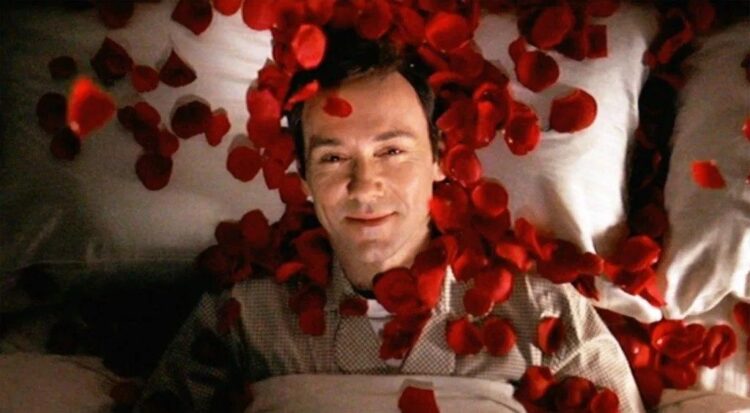Nobody does domestic drama quite like Sam Mendes. Comparing ‘American Beauty‘ and ‘Revolutionary Road’ side by side, the tensions, the staging, the set pieces, and the dialogue centered around them, it is not really that hard to arrive at Mendes’ theatre roots — the mastery just reveals itself quite naturally. Although by this time Mendes’ body of work has become quite prolific, containing grand war epics and two hit Bond movies, I am going to make the discussion focus deliberately on ‘Revolutionary Road’ and ‘American Beauty’, two of his most impactful films to me, and then focus more on the latter.
The two movies thematically share many points of similarity. Both ‘American Beauty’ and ‘Revolutionary Road’ are successful case studies, and in themselves, criticisms of the always elusive American Middle Class and the domestic confrontation lurking beneath deteriorating marriages, delinquent mortgages, the transitory temptation of adultery, the fear and stress of children growing up in a harsh environment like this, and to put the cherry on top, the always elusive American dream: just trying to make it is perhaps an age long endeavor that a number of patrons embark upon, only to end up at the same place as Lester Burnham. It’s as though the American suburban ideal that for now so long has been peddled across billboards and out back-to-let signs of duplex houses has dulled and been flipped on its head, by sheer dint of the shattered people within them.
What’s also intriguing is that even as the setting is wholly, spine-tinglingly similar in both movies, the nature of domestic and marital strife, and that of a midlife crisis, a pervasive theme in ‘American Beauty’, are of a relatively universal nature — to be uncertain as to what to anticipate next is but the most human thing. That is what I believe ‘American Beauty’ does rather beautifully, and if I am to describe it in more words, rather heartbreakingly and how Mendes achieves it while maintaining all of these characteristics in his story that make the film experience what it is, is indeed the man’s art; something which I am utterly awed by.
What’s even the more fascinating is that this specific time, the turn of the millennium (and the century), was marked by a series of such films coming out around conspicuously short gaps in time from each other, such as ‘Magnolia’, ‘Fight Club’ and this one, challenging the illusion of corporate consumerism’s false ideal, the look of a perfect life, and challenging the viewer to seek more, just more. Of the two, I think ‘Fight Club’ is weirdly in the same line as ‘American Beauty’, without the ultra-violence and uber-cool sermonizing. The majority would deem me whacked in the head if I put ‘Fight Club’ and ‘American Beauty’ in the same line, but a careful look at their themes and not as films would uncover this discussion’s value. Anyway, no further ado and after having adequately paved the way for a rather juicy discussion, let’s move on to what ‘American Beauty’ and more specifically its conclusion meant to you.
The Ending, Explained
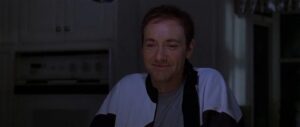
I reckon the climax of the third act starts with Lester’s revelation of Carolyn’s adultery with her professional attorney Buddy Kane, to which he responds quite unemotionally, and might I add, in patently ridiculous farcical fashion. The two call off the relationship, citing an costly divorce and too much to handle by Buddy. She does not go back home until late that evening. She is next seen driving to her home, extending into her glove compartment for the gun, and lying to herself as she continues to say again and again that she wouldn’t be a victim.
At the Durnhams’ home, Jane shows up with Angela as Lester hits on her to the ire of Jane. An already suspicious Frank at the Fitts’ home searches Ricky’s room to find Lester nude and lifting weights in footage that Ricky had recorded by mistake earlier in the movie, proving his suspicion. To pour salt to injury, Frank mistakenly observes Ricky at Lester’s and misinterprets them as engaging in sexual activities, on which he brutally accosts Ricky upon his return home, threatening to banish him for his homosexuality. Ricky, frustrated at this point, believes the accusation and uses it to pressure him into throwing him out of their house. Ricky subsequently approaches Jane and requests that she elope with him to New York. As she is in a fight with Angela over the same and her father’s moves towards Angela, Ricky stands up for Jane informing Angela that she was mundane and dull and insecure regarding the same, something which immediately reaches her as we find her crying in the stairway soon thereafter.
A devastated Frank subsequently accosts Lester in the garage seeking some relief, and attempts to kiss him exposing his own closeted homosexual inclinations behind a homophobic facade, which Lester incorrectly rejects. Subsequently, Lester finds a despondent Angela in their home, and the two go on to have a gentle dialogue about beauty, with Lester informing her how lovely she was. They embrace, and just as they’re ready to engage in sex, Angela lets it be known she’s a virgin, in stark contrast to what she had been acting out previously. Lester chooses not to engage in sex with her, and the two end up having quite a sweet conversation in the kitchen instead.

Just as Angela gets up to use the bathroom, Lester apparently reminisces about older times with his family while looking at a photo, just as he is shot in the head from behind by Frank, who returns to his seat, remorseful, covered in blood. We see the family, particularly Carolyn grieving the loss of Lester, and an interested Ricky looks over Lester’s corpse, something beautiful to him. The movie ends with a monologue by Lester while we view a montage of Lester’s life, as it appears to flash before his eyes.
I think I could be really angry with what’s happened to me; but it’s difficult to remain angry when there’s so much beauty in the world. At times, I feel like I’m seeing it all simultaneously, and it’s too much – My heart gets filled up like a balloon that’s ready to explode And then I remind myself to relax, and not try to hold on to it.”. And then it runs through me like rain. And, I don’t feel anything but thankfulness for every moment of my idiotic little existence. You have no idea what I am talking about, I’m sure. But, don’t worry. You will someday.
I’d say that is one of the most bittersweet endings I have witnessed in a while, but more bitter than sweet, for in its last bits, it poses the most perilous question. It does not permit you to go home with the assurance of it all being fantasy. Horribly so, it provokes you to introspect. Now to some longing questions:
Why Don’t Lester and Angela Have Sex?
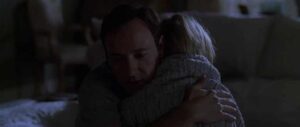
At the moment that Angela tells Lester that she is not a virgin, his perception of her entirely shifts. He comes to perceive her not as a thing that brought lust on him, but as a thing of beauty. Despite that she is insecure and feels like an idiot about what she did, he truly comforts her, nearly as he would a daughter, that she was beautiful, and shares with her his family.
Did Carolyn Want to Kill Lester?

Lester’s internal defiance and convenient ostracism of all that mattered was sure to attract both inspiration and loathing. As her illegal affair with Buddy terminates, Carolyn somehow starts blaming Lester for it, even unjustifiably, though she was the one who had cheated. Frank’s apathy regarding the entire episode contributes to her fury and guilt, as Carolyn arrives at her home, ready to shoot Lester.
Why did Frank kill Lester?
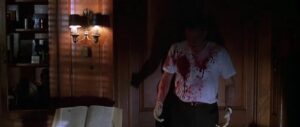
This is a very simple one really. Frank was a serious sort of man and it was not too hard to discern that he was concealing more than he was able to explain; his very wariness about anything indicated a lot of repressed feelings and facts regarding him. His tough exterior finally unravels as he surrenders and seeks bodily support from Lester who he believes is homosexual as well. He is, in a sense, motivated by the fact that Lester accepted his own (imagined) homosexuality without hesitation and convinced his wife to agree to it too, all of it untrue but it is nonetheless what he interprets from the exchange. When he was rejected, it is Frank’s rejection that led him to murder Lester. As his advances and a kind of acceptance to himself amounted to nothing, he just could not go on living with that knowledge out there, which is exactly why he had kept it locked inside for so long: Society.
Themes
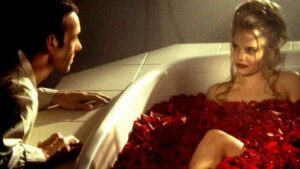
Though all the people connected with the film, right from the director, the scriptwriter Alan Ball, to some cineastes and film scholars who have held the film up to a microscope in order to make their judgments on the film’s multiple themes and motifs have consciously avoided giving a single reading of the film, or a single theme which appealed to them, for me, desire, and that of a primal nature, would be it; at least in the broad sense, as there are a number of them that I think stem from this one.
All the rest of the themes that revolve around the main characters inheres from their will to gain something they lack or become something they are not. In which I then look at ‘American Beauty’ as a wicked ideal, an unachievable high expectation or point of reference, something that cannot be obtained, yet something that possesses an all conquering pull, albeit futilely, since all the main characters in the story act based on it: desire. The slow, intentional employment of sometimes odd and sometimes wonderfully real imagery with a heavy deployment of red, the color of lust, heightens that: whether the roses or the red door at the entrance of the house of the Durnhams.
Still, here I also have to say once again that the movie is about this trip that the characters embark: to the fulfillment of those wishes. The point to that trip is never achieved, but all of them along the way understand the transient character of beauty per se, as something that one finds in the most ordinary things, as they leave behind their own self-imposed exile and incarceration.
Their prison would be this for each of them: Lester’s would be that of mundanity and having succumbed to a kind of natural sedation as one advances through life without ever really getting anywhere. The prison for Carolyn would be that of her own failing vision of success and material comforts she identifies herself with. For Angela and Jane, it would be their own adolescent insecurities, whereas for Ricky, it would be the hold of his abusive dad. The biggest shocker to me is Frank’s prison — his natural homosexual urges that he’d had in secret for much too long for fear of being rejected by society as a marine.
Having established that, the beautiful could then be anything: an escape from your dying existence, a fleeting asylum from your fraught marriage, your daughter’s high school friend, a long fantasized consonance in thoughts even if from a stranger or a polythene whizzing around in the air. Of course, that realization and the journey has a sad conclusion for the majority, particularly for Lester who ends up losing his life in the process, but I think by the time in the movie, it didn’t really matter to him. Even in his last seconds, just before Frank kills him in the head, he appears to be euphoric, almost nirvanic, having achieved a kind of enlightenment that he always dreamed of. The sound of the gunshot resonates through several shots depicting the characters’ reactions to it, along with how the characters’ lives would change in the aftermath of that event.
Final Word
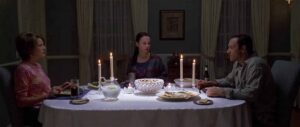
The reason for the longevity and a certain timelessness appeal for these movies that came out at the beginning of the century is a certain shared identity among them, of avoiding the negative of all that modernism brought. ‘American Beauty’ is a good example of that. It strays adeptly into the universally difficult concerns of psychic confinement, isolation, of beauty, the need for conformity, and of a midlife crisis. Having stated that, in all its present consonance, I would not want to catch it some time again in the foreseeable future, because its pertinence usually comes at a price: self-awareness. One who has seen the movie and been moved by it simply cannot avow that someway the morosities of their own life, whatever they were, did not unfold before their eyes as Lester gave the final monologue. If you somehow didn’t or still haven’t, “you will someday.”.







